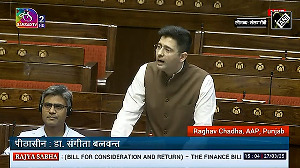S Gurumurthy was ridiculed when he spoke about swadeshi in 1991. Ten years down the line many now accept that it is necessary to have someone with this viewpoint in a globalised India.
 In a frank tete-a-tete with Special Contributing Correspondent Shobha Warrier, the convener of the Swadeshi Jagran Manch also speaks about the Indian economy and the success stories that small industrial centers like Tirupur, Namakkal and Sivakasi have turned into.
In a frank tete-a-tete with Special Contributing Correspondent Shobha Warrier, the convener of the Swadeshi Jagran Manch also speaks about the Indian economy and the success stories that small industrial centers like Tirupur, Namakkal and Sivakasi have turned into.
You have been talking about the entrepreneurial successes of small places like Tirupur, Namakkal and Sivakasi. But what about the closure of several textile units in Tirupur? Or the adverse effect of the cut in excise duty on factory-built truck bodies on units in Namakkal?
As far as Namakkal is concerned, the body building units and large truck manufacturers need to work together. This is not what is happening.
In fact, if these small operators get some kind of affiliation or franchise rights, it will ensure better quality work and a more organized way of working. They will also get assured work.
We, thus, need to work out a Japanese model of outsourced work. For example, Ashok Leyland can outsource its body building work from units in Namakkal.
How do you react to the lowering of excise duties on truck bodies?
There is some sense in this tax. Earlier, you paid tax only when the company built the body, not otherwise. This is a kind of evasion. So, by plugging this, the government has made escaping excise duty net difficult.
Are you happy with the way the government is taking care of the centres of excellence?
My complaint against the government has been that it is not aware of what is happening. Many people in the finance ministry do not know what people in Tirupur are doing.
The Swadeshi Jagran Manch, therefore, suggested that the government must announce an industrial cluster policy, which it has now done. They (the government) have chosen Tirupur as the knitwear industrial cluster, Coimbatore as the casting and pump set-making industrial cluster. Similarly, some 42 such clusters have been chosen in India. This is only because of the campaign started by the Swadeshi Jagran Manch.
We also fought for Sivakasi. If not for us, Sivakasi would have been destroyed completely. Who was destroying Sivakasi? Not the government, but non-governmental organizations. And the media.
And for each of these clusters, they have named a monitoring agency. For example, they have named the Tirupur Exporters Association as the monitoring agency in Tirupur because it is predominantly an export centre.
The government is allocating Rs 50 crore (Rs 500 million) for the development of these centres.
So, I would say, we are seeing a more focused policy from the government.
You said the finance ministry was not aware of what was happening in Tirupur when it was bringing in large amounts of money through exports...
Why do you blame the government alone? Was the media aware? What has the media done to Karur, Tirupur, Namakkal and Sivakasi?
Media and some NGOs have only tried to destroy these places by focusing on child labour. The media in this country can only ask questions.
The belief that the government must know everything is a socialist one. The market too must know everything; and local administration, businessmen, professionals and media are part of the market forces.
What do you attribute the success of such small places to?
Hard work.
The more deprived a place is, the more hard working its people are. Thanjavur district did not develop industrially because it is not a deprived place. Wherever you find water shortage, wherever there is no irrigated land, you find the people of that area very hard working. They take to industry, businesses and manufacturing.
Is deprivation the only reason for their hard work and success in their endeavours?
People of India have the capacity to do things. Each community has done something admirable. These are community-driven models.
I would say, IITs and IIMs (Indian Institutes of Technology and Indian Institutes of Management) are not the ones that generate centres of enterprise in India; it is the communities.
People who set up businesses are very ordinary people. Of 300 families which export knitwear from Tirupur, 90 per cent do not even know English.
For example, in Tirupur, people had some skills, which they needed to exploit. First, they were cotton cultivators. From cotton cultivating, they went to ginning, from ginning to spinning, from spinning to weaving, and from weaving to knitting. This is how the entire area moved ahead. They developed skills in stages.
What kind of help are these communities getting?
I don't think they are getting any help. They succeeded through their own hard work.
In fact, I don't want the government or media or NGOs to disturb them at all. The greatest disturbance comes from the NGOs and the media, and then from government officials.
Why did the Swadeshi Jagran Manch ask the government to have an industrial cluster policy? Will it not disturb them?
The government has recognised that the clusters do good work. Cluster policy recognises that there is an atmosphere for development and growth in clusters.
They wanted to create an artificial industrial centre near Madurai as a knitwear centre. There are only sheds available now! Nobody has made any knitwear there. Why? Because you cannot artificially construct business.
Businesses have to evolve with the skill and hard work of the people. So, repeating Tirupur near Madurai failed.
This is not the work of the market; this is the work of the community. Which place has the highest per capita income in India? Not Mumbai, Delhi, Chennai or Bangalore. It is Morvi in Gujarat, where they make Ajanta wall clocks!
Can anyone help evolve such skills in an area? If so, how?
I think it is only social capital which can do it. In my view, the community is the social capital in India. Take Tamil Nadu, for instance. The Naidus, the Kongu Goundars, the Nadars, and the Rajus took to commerce there. These communities developed financially, educationally and socially.
The Thevar community and Vanniyar community took to politics. They became government dependent in their mindset. If you become dependent on the government, your development will stagnate.
Community structure is, thus, the social capital through which the country can develop. It is being wasted in politics.
I also would say that the media has failed to highlight community success stories. The intellectuals and media have a responsibility in helping communities evolve. But they have failed in their duties.
What does the Swadeshi Jagran Manch plan to do in future?
We are not planning to do anything. We are studying; we are trying to understand the social and political situation in India.
This is our open air university. Once we empirically study and understand, we will begin forming opinions. We have no money or expertise. We only create awareness. We are generating the desire for self effort through awareness campaigns.
I feel traditional skills are suffering from lack of recognition by the establishment; be it the government, or the judicial system, or the media. They can't understand that Indians can function only in small collectivities, they cannot function as atomized individuals.
For example, in the West, there is social security which is an atomized plan. In India, it is the families that take care of social security.
But what policy do we have for the family? You are treating the Indian individual like a Western one and taxing him. Here, he is taking care of five to eight people. But policy makers, economists and media are completely ignorant of this fact. You need a very different approach to India.
Against the backdrop of globalisation, how difficult is it to talk to people about swadeshi?
India is one sixth of humanity. Opinion formation takes a long time here; particularly when you have Westernised people to run the country and make opinions.
Why did you think of swadeshi?
Globalisation and liberalization were the reasons. With socialism, we were committing one type of mistake. With globalisation, we were committing another.
The government's socialist policies have already stifled this country's enterprise. This also created very poor work culture.
The Western belief -- that the government will do nothing and the market will do everything -- is also wrong. In India, the delivery mechanism is not just the market; it is the family, it is the community, it is the state and the market.
The market is only one of the institutions of delivery and it is not the sole institution. This was the base of the Swadeshi Jagran Manch. And, now we are proving to be right.
Are you happy with what the finance minister has offered in his Budget?
See, there is nothing in the Budget for agriculture, especially when agricultural production has dropped by 15 to 16 per cent. This is a serious omission.
The Budget is made according to the opinion of the middle, upper-middle and educated classes. Budgets mainly look to satisfying them.
What kind of impact will the neglect of agriculture have on Indian economy?
If the bottom of the pyramid is not taken care of, it is going to have a long-term impact on the economy.
Besides ignoring agriculture, the Budget also doesn't talk about an agenda for the textile industry which is going to face international competition in 2005. It is also an omission.
What about competition from China?
India has inherent strengths. Unfortunately, it has not been properly augmented. You must know the basic strength of India doesn't lie in Mumbai, Delhi or Kolkata.
India's strength is its industrial clusters.
India is already a global player. Doesn't China have poverty? But they are not talking about poverty. Here, you are talking all the time about India's poverty. Indians must understand India first. They must begin talking well of India.
It doesn't matter to me at all to hear that India's share of global trade is 0.75 per cent. Global trade is not the index of a country's development. So long as India can generate domestic demand, India can be a big player.
In fact, one sixth of humanity cannot depend on global trade. It has to be largely dependent on domestic trade. So we are applying norms applicable to small countries like Japan, Korea, and Taiwan, to India. That is because you don't have originality. You set wrong benchmarks and suffer in comparison.






 © 2025
© 2025